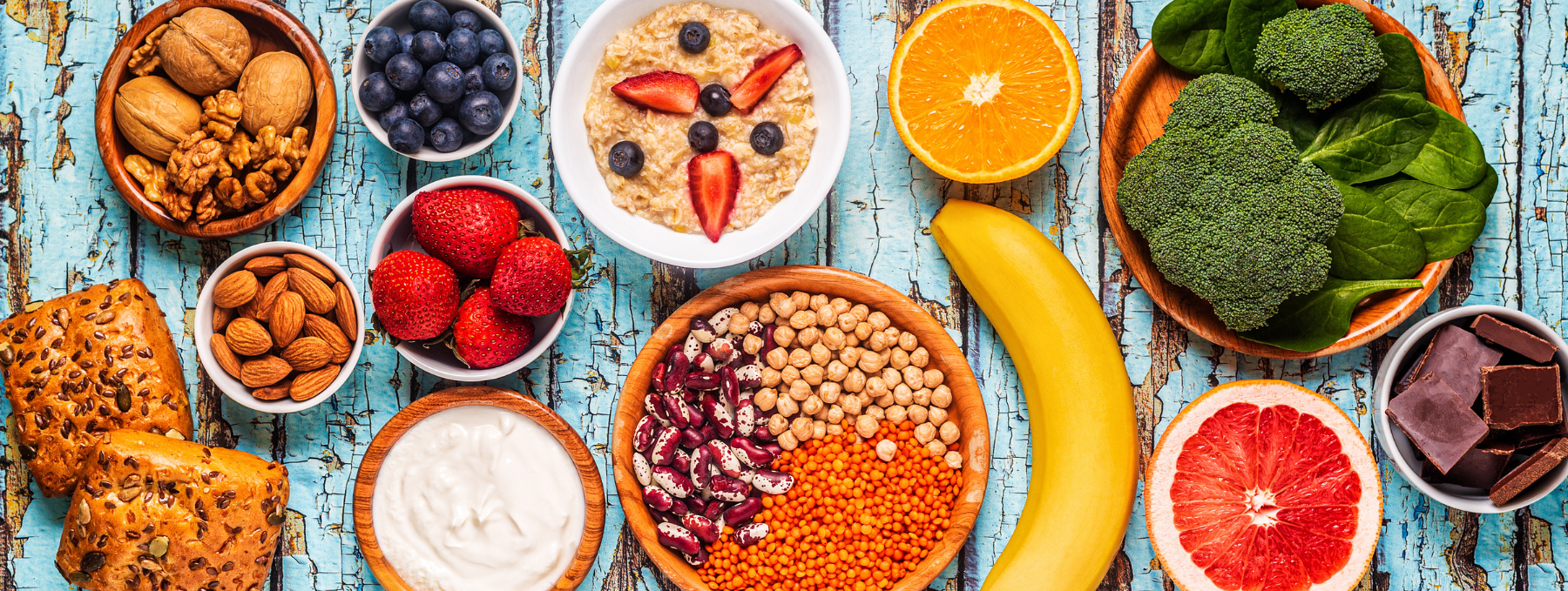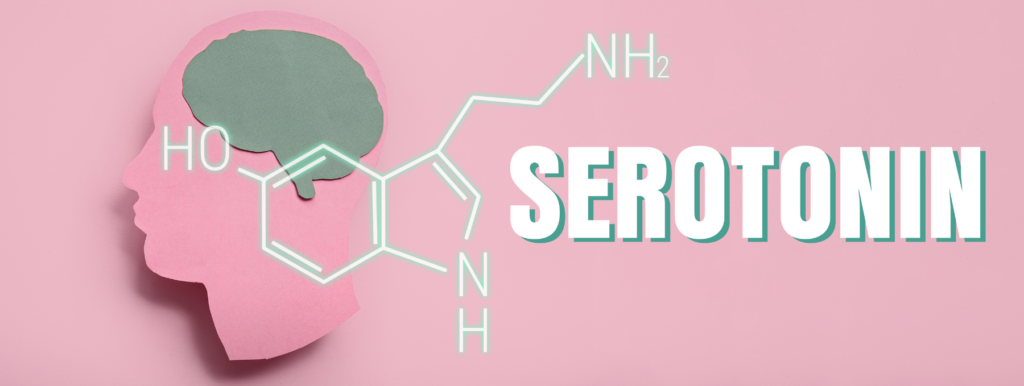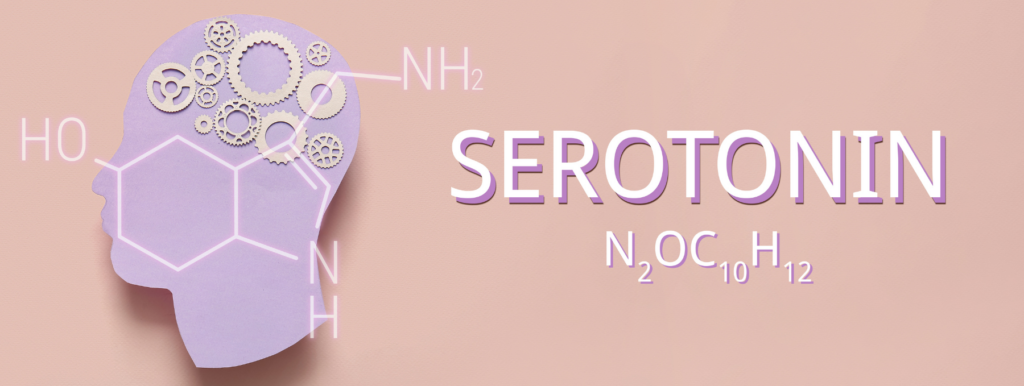Serotonin is often dubbed the “happiness hormone” due to its significant impact on mood, emotions and overall well-being. As a neurotransmitter, its primary function is to transmit signals in the brain to influence various bodily functions such as mood regulation, digestion and sleep. However, what many may not know about serotonin and nutrition is that nutrition plays a critical role in serotonin production and regulation.
Here, we will explore the relationship between serotonin and nutrition, delving into the which key nutrients are needed in the diet to avoid serotonin deficiency, how these nutrients affect serotonin levels and guidelines for dietary choices that can help enhance both mood and mental health.
Understanding Serotonin and Its Functions
Serotonin is an important neurotransmitter that plays an integral role in mood and mental health. Synthesized primarily in the gastrointestinal tract, about 90% of the body’s serotonin is found in the gut, while only 10% exists in the brain. Serotonin’s functions extend beyond simply regulating mood; it also plays vital roles in several other bodily processes.
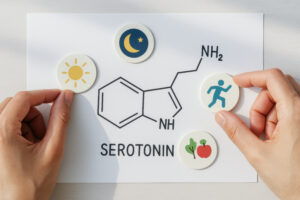 One of serotonin’s key functions is sleep regulation. This is because serotonin serves as a precursor to melatonin, which controls the sleep-wake cycles. Additionally, serotonin is crucial for appetite control, because it helps regulate hunger and satiety signals, thus influencing eating behaviors. It also particularly important for digestive health because it affects gut motility, determining how quickly food moves through the gastrointestinal tract. Serotonin is also involved in cognitive function, with healthy serotonin levels contributing to learning and memory.
One of serotonin’s key functions is sleep regulation. This is because serotonin serves as a precursor to melatonin, which controls the sleep-wake cycles. Additionally, serotonin is crucial for appetite control, because it helps regulate hunger and satiety signals, thus influencing eating behaviors. It also particularly important for digestive health because it affects gut motility, determining how quickly food moves through the gastrointestinal tract. Serotonin is also involved in cognitive function, with healthy serotonin levels contributing to learning and memory.
Conversely, a serotonin deficiency can result in various mental health issues, including depression, anxiety, irritability and sleep disturbances, highlighting this neurotransmitter’s importance for overall well-being.
The Connection Between Serotonin and Nutrition
The relationship between serotonin and nutrition is a complex yet vital aspect of mental and physical health. Diet and nutrition significantly influence serotonin levels in the brain, primarily through their direct effect on the availability of essential nutrients needed for its production. Understanding how dietary choices impact serotonin production can empower people to make informed nutritional decisions that support their mental well-being. In this section, we will explore the key nutritional components that affect serotonin levels and how a balanced diet can enhance mood and overall mental health.
The Role of Tryptophan
Tryptophan is an essential amino acid; our bodies cannot produce it, and we must obtain it solely from our diet. Tryptophan is the precursor to serotonin, making it a critical player in serotonin production. Foods rich in tryptophan include:
- Turkey and Chicken: These poultry options contain high levels of tryptophan and turkey is commonly associated with post-Thanksgiving drowsiness, a phenomenon linked to its tryptophan content.
- Eggs: The yolks of eggs also contain vitamin B6, which aids in the conversion of tryptophan into serotonin.
- Dairy Products: Milk, cheese and yogurt are excellent sources of tryptophan.
- Nuts and Seeds: Almonds, walnuts and pumpkin seeds also provide a good supply of tryptophan.
While tryptophan is essential for serotonin production, its availability in the brain is influenced by several factors. One key aspect that affects tryptophan’s effectiveness is the presence of other amino acids that compete with tryptophan for transport across the blood-brain barrier. Consuming a carbohydrate-rich meal can facilitate the transport of tryptophan by increasing insulin levels, which helps clear competing amino acids from the bloodstream.
The Influence of Carbohydrates
Carbohydrates play a crucial role in serotonin production and thus can significantly impact mood and mental health. When consumed, carbohydrates are broken down into glucose, which triggers the pancreas to secrete insulin. Insulin facilitates the uptake of amino acids, including tryptophan, into the brain, allowing for increased serotonin synthesis. This highlights the beneficial link between carbohydrate intake and mood, where a diet rich in carbohydrates can enhance serotonin levels and promote overall well-being.
However, not all carbohydrates have the same effect. Complex carbohydrates, found in whole grains (like oats, quinoa and brown rice), legumes (such as beans and lentils), fruits and vegetables, are digested slowly, leading to stable blood sugar levels and sustained energy. These steady glucose levels help regulate mood and reduce irritability associated with blood sugar fluctuations. Additionally, complex carbohydrates provide essential nutrients and fiber that support overall health. In contrast, simple carbohydrates found in sugary snacks, pastries and processed foods can cause rapid spikes in blood sugar, leading to energy crashes and mood swings. Frequent consumption of these foods can contribute to long-term health issues like diabetes and exacerbate feelings of anxiety and depression.
To optimize serotonin production and mood regulation, focus on incorporating whole grains, fruits and vegetables into your diet. Choose whole grain bread, brown rice and legumes, which provide sustained energy and nutrients. Be mindful of portion sizes, particularly with simple carbohydrates. By prioritizing complex carbohydrates and limiting sugars, you can create a supportive environment for serotonin production, promoting enhanced mood and overall health.
Vitamins and Minerals
Vitamins and minerals are essential nutrients that play crucial roles in numerous bodily functions, including the production and regulation of neurotransmitters like serotonin. These micronutrients support the biochemical processes necessary for synthesizing serotonin and ensuring its optimal function in the brain. A deficiency in specific vitamins and minerals can negatively influence serotonin production, potentially contributing to mood disorders and other mental health challenges.
Vitamin B6
Vitamin B6 is essential for converting tryptophan into serotonin. A deficiency in this vitamin can hinder this conversion, thereby affecting overall serotonin levels. Sources of vitamin B6 include:
- Poultry: Chicken and turkey provide great amounts of vitamin B6.
- Fish: Salmon and tuna are excellent sources of this important vitamin.
- Potatoes: Potatoes are a delicious and versatile food that contain B6.
Folate (Vitamin B9)
Folate is another critical nutrient for the synthesis of neurotransmitters, including serotonin. Low levels of folate have been connected to mood disorders. Good dietary sources of folate include:
- Leafy Greens: Spinach, kale and romaine lettuce are rich in folate.
- Legumes: Beans, lentils and chickpeas provide substantial amounts of folate.
 Vitamin D
Vitamin D
Vitamin D receptors are found in serotonin-producing neurons, which suggests that adequate vitamin D levels may promote serotonin activity. Good sources of vitamin D include:
- Sunlight: The body can synthesize vitamin D upon exposure to sunlight.
- Fatty Fish: Salmon, mackerel and sardines are rich in vitamin D.
Omega-3 Fatty Acids
Omega-3 fatty acids, particularly EPA (eicosapentaenoic acid) and DHA (docosahexaenoic acid), are essential fatty acids that our bodies cannot produce on their own; thus, it is necessary to obtain them through our diet. Omega-3 fatty acids play a significant role in maintaining brain health and in mood regulation. These healthy fats can enhance serotonin receptor function, meaning they may improve how the brain responds to serotonin.
The Importance of Omega-3 Fatty Acids
Research has shown that omega-3 fatty acids can significantly improve brain function and mental health. One of the key benefits of these fatty acids is their ability to enhance serotonin receptor function, making it easier for available serotonin to exert its effects on mood and behavior. Additionally, omega-3s play a crucial role in reducing inflammation, which has been linked to various mental health issues, including depression. Furthermore, some studies suggest that omega-3s can support neurogenesis—the growth of new neurons—thereby enhancing cognitive function and potentially aiding in recovery from mood disorders.
Dietary Sources of Omega-3 Fatty Acids
Incorporating omega-3-rich foods into your diet can be a simple yet effective way to improve serotonin levels and overall mental health. Here are some excellent sources of omega-3 fatty acids:
- Fatty Fish: Salmon, mackerel, sardines and herring are among the richest sources of EPA and DHA. Aim to include these in your meals at least twice a week for optimal benefits.
- Flaxseeds and Chia Seeds: These seeds are excellent plant-based sources of alpha-linolenic acid (ALA), a type of omega-3 fatty acid. They can be added to smoothies, oatmeal or yogurt for an extra nutritional boost.
- Walnuts: A convenient snack option that is also high in ALA, walnuts can be enjoyed raw or added to various dishes.
- Algal Oil: For those following a vegetarian or vegan diet, algal oil is a plant-based source of EPA and DHA and can be taken as a supplement.
The Role of Probiotics and Gut Health
Understanding the gut-brain connection is crucial when discussing serotonin and nutrition. A significant portion of serotonin is synthesized in the gastrointestinal tract, making gut health vital for optimal serotonin production.
How Probiotics Influence Serotonin Levels
The gut-brain axis is a bidirectional communication system linking the gut and brain. The gut microbiome, composed of trillions of bacteria, plays an essential role in this communication. A healthy gut microbiome can positively influence serotonin synthesis and secretion.
Probiotics are beneficial bacteria known for their ability to improve gut health. Research indicates that specific strains of probiotics may enhance serotonin levels through several mechanisms. Firstly, certain bacteria in the gut can help break down proteins into amino acids, including tryptophan, thereby increasing its availability for serotonin production. Additionally, probiotics ferment dietary fibers to produce short-chain fatty acids (SCFAs), which have been shown to positively impact brain health and mood.
Dietary Sources of Probiotics
To support a healthy gut microbiome, consider incorporating the following probiotic-rich foods into your diet:
- Yogurt: Choose varieties with live and active cultures for maximum benefit.
- Kefir: Kefir is a fermented dairy drink that contains a diverse range of probiotic bacteria.
- Sauerkraut and Kimchi: These fermented vegetables are rich in probiotics and can add flavor to meals.
- Miso and Tempeh: Miso and tempeh are fermented soybean products that provide a plant-based source of probiotics.
The Interplay of Nutrition and Mental Health
While nutrition is a vital component of mental well-being, it’s essential to recognize that it does not act in isolation. Mental health is influenced by various factors, including genetics, environment and lifestyle choices. However, adopting a nutrient-rich diet can serve as a foundational step in promoting better mental health outcomes.
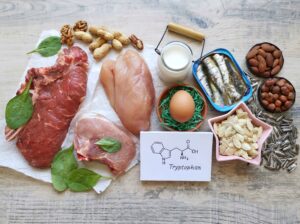 If you’re looking to improve your mood and support serotonin production through nutrition, consider these practical strategies:
If you’re looking to improve your mood and support serotonin production through nutrition, consider these practical strategies:
- Balanced Diet: Aim for a well-rounded diet rich in fruits, vegetables, lean proteins, whole grains and healthy fats. This will ensure you’re supplying your body with the essential nutrients needed for optimal serotonin production.
- Prioritize Tryptophan Sources: Regularly include tryptophan-rich foods like turkey, eggs and dairy in your meals.
- Incorporate Carbohydrates Wisely: Combine protein-rich foods with complex carbohydrates to facilitate tryptophan’s transport to the brain.
- Focus on Omega-3s: Incorporate fatty fish and plant-based omega-3 sources into your diet.
- Include Probiotics: Incorporate probiotic-rich foods to enhance gut health and possibly boost serotonin levels. Yogurt, kefir, sauerkraut and fermented soy products are excellent choices. Consider taking a high-quality probiotic supplement if these foods are not regularly part of your diet.
- Stay Hydrated: Adequate hydration is crucial for overall health, including mental well-being. Dehydration can lead to mood swings and cognitive impairment. Aim to drink plenty of water throughout the day.
- Limit Processed Foods: Highly processed foods often contain unhealthy fats, sugars and additives that can negatively impact mood and energy levels. Focus on whole, minimally processed foods for a healthier diet.
- Regular Meal Timing: Skipping meals and experiencing large fluctuations in blood sugar levels can negatively affect mood. Aim for regular meal times to provide your body with consistent energy and nutrients.
- Mindful Eating: Pay attention to your eating habits. Engaging in mindful eating can foster a better connection with food, making it easier to make healthier choices.
The Vital Interplay Between Serotonin and Nutrition
Serotonin deficiency can significantly impact mental health, leading to a range of issues from mood disorders to sleep disturbances. Due to the critical interplay between serotonin and nutrition, diet plays a pivotal role in maintaining optimal serotonin levels. By focusing on a balanced diet rich in tryptophan, omega-3 fatty acids, vitamins, minerals and probiotics, you can support your body’s ability to produce serotonin and enhance overall health and well-being.

